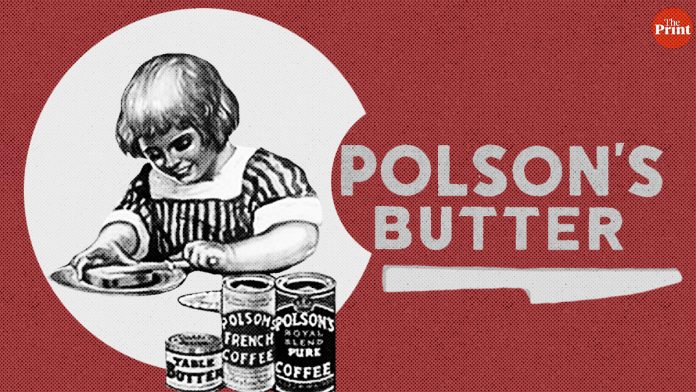Polson butter had monopolised the business by the 1930s and become a household name in India, much before the Amul revolution.
Article by Mahua Venkatesh | The Print
Much before India became independent and Anand Milk Union Limited started the Amul revolution, Polson became India’s first commercially made butter.
Launched by Parsi entrepreneur Pestonji Edulji Dalal in 1900, Polson was initially a coffee manufacturing company. It diversified into the butter business when a customer complained that there wasn’t enough butter for the armed forces. It set up its first dairy in Kaira, Gujarat.
Dalal’s nickname Polly was chosen and given a British twist to name the company ‘Polson’.
By the 1930s, Polson dominated the butter business in India.
“The brand was well distributed and advertised. So much so that Polson became a generic word for butter around the 1950s and 1960s,” advertising and marketing expert Navroze Dhondy said.
A unique taste
Polson’s butter was salty, but nothing to write home about.
So, the marketing strategy had to make up for the taste. And it did.
Polson started offering gift coupons with each purchase, which could be collected and redeemed to buy toasters or mixers.
It was marketed as butter that children loved. “Guard their health and give them the best,” the ad read.
Polson’s brand connect was huge, pointed out brand and marketing consultant Harish Bijoor. “It was about wholesomeness, it was local and Indians trusted and loved it,” he said, adding that Polson’s image kept growing until the late 1960s when Amul entered the market.
The competition
If in the early 1900s Polson’s competition was households who were making their own butter, after the 1960s it was Amul.
“Most housewives and mothers would churn milk to make butter, buying butter was an alien concept,” pointed out an advertising consultant.
The butter, with its not so pocket-friendly pricing, was targeted at the affluent and Anglo Indians. “It was almost like a status symbol to have bought butter at home. Mind you these were the days when few homes had refrigerators,” Dhondy said.
The downfall of the brand started when Amul entered the market.
Dairy farmers in the country were in a deplorable condition. Dairy engineer Verghese Kurien was entrusted with the responsibility of spearheading the co-operative movement that went on to
become the mammoth Amul. In the beginning, Amul found it difficult to beat Polson because Indians were used to the Polson taste.
But Amul’s branding and quality was far superior and Polson was soon wiped out of the market.
Bijoor pointed out that part of the problem was Polson’s own creation. “Polson thought small,” he said, adding that the brand may be
dead but its recall value is still “huge” with many Indians.

